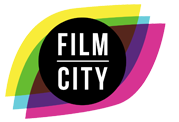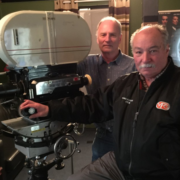“The camera is God”
Two highly skilled local cameramen, Peter Ditch and Ray Moore, have accumulated a wealth of experience at the coalface of the British film and television industry. They reveal the significance of a short end, the art of focus pulling, and their favourite cinema in Brighton.
Being a milkman is a dying trade these days, but for Peter Ditch, it’s a profession that has played a significant part in his career in the film industry not just once, but twice.
Brighton-born Peter developed a love of photography from an early age, and by his early teens had acquired a Box Brownie camera and his own darkroom at home. He applied to the National Film School at 17 but was unsuccessful due to lack of experience. While working as a milkman alongside his father, Peter made deliveries to filmmaker Derrick Wynne who lived in Seaford and was head of Brighton Film Studios during the 1950s.
Derrick was looking for a driver at his London studio, and this was too good an opportunity for Peter to miss. After shadowing for just a week, he found himself making deliveries throughout busy London streets in a tiny van. “It was horrendous!” he recalls with a laugh. “I was always getting lost. Somehow I lasted the course to become an in-house clapper loader.”
Peter outlines a typical scenario where the director has set up a shot that is likely to take around a minute to film. The clapper loader knows that there is around one and a half minutes of film left in the can. But what if the actor forgets their lines? The director may call cut; alternatively, he or she may decide to keep rolling to maintain the momentum of the scene.
“You mustn’t run out of film, but equally you mustn’t waste film,” Peter says. He explains that if a clapper loader in this situation loads new film straight away, they will be left with ‘short ends’, and too many of those are judged to be a sign of wastefulness.
Peter’s friend and colleague, Ray Moore, loved going to the cinema while growing up in Edgware and worked as a film projectionist for the ABC circuit and in the West End after leaving school. “This was what got me superglued to images because I’d see movies over and over again.”
A cameraman took Ray to see a commercial being shot and was instrumental in helping him to get his union card. Alongside ‘very hard’ and incredibly disciplined colleagues, Ray worked as a camera assistant, then completed a 12-month course and entered ‘the premier league’, first as a focus puller, then as a 1st assistant cameraman.
Ray likens the process of focus pulling to ‘writing in the dark’ because you can’t know how successful you’ve been until you see the rushes.
“The focus puller is responsible for the definition on the screen. Everyone who watches a film is aware if an image is soft focus, even if only subliminally, so it’s really important to work out where on the shot the focus will need to be,” he explains.
Peter and Ray first worked together on The Amorous Milkman, a 1975 comedy starring Diana Dors which was directed by Derren Nesbitt. Other projects they worked on alongside each other include The Brylcreem Boys, shot in 1996, one of the first movies to be filmed on the Isle of Man.

Over several decades both men built notable careers. Ray’s extensive TV credits include The Persuaders and Band of Brothers, as well as a BAFTA Award-winning short film called Goody Two Shoes. Peter found his niche as a cameraman in documentary film and loved the autonomy of being much more fully involved in every aspect of the creative process. Among his career highlights are his collaborations with actor and documentary maker Kenneth Griffith, including the BBC documentary Against The Empire: The Boer War, which won a Broadcasting Press Guild Award.
Both men are unashamed old-school technicians, unassuming about their success, appreciative of the “extraordinary” experiences they’ve had and above all, proud of their craft.
“When the camera’s set up you have a frame, and all the other collective art forms start doing their best work within that frame. The camera is God – everything revolves around the camera,” says Ray.
The two men retain their enthusiasm for the industry, and an avid interest in how it continues to develop. “Everyone can make a film on their iPhone now because of the way that technology has moved on. In the past you were restricted because you could only work with film. There are pros and cons, like with everything, but in some ways I think it’s great,” Peter says.Having spent many years at the heart of the film and TV industry, the current work being done by the two men is equally valuable. As technical supervisors, they are passing on their expertise and knowledge to students at Brighton Film School.
Ray sounds a note of caution, expressing concern that “the craft of film-making has been prostituted by digital technology.” But he can see many positives for up-and-coming filmmakers too. “You can edit a film and do post-production in your bedroom now, you don’t have to go to London – I think that’s remarkable.”
Above all, the two men have held on to their passion for cinema. When they’re not busy running Brighton Film School workshops, they can often be found at the Dukes Komedia on a quiet afternoon watching the latest releases (Birdman was a recent favourite). As Ray says ‘there is nothing like sitting in a darkened room watching a film and there is some outstanding material out there. Cinema is alive and well.”
Peter and Ray’s words of wisdom:
– Don’t be late!
– A good camera assistant is always thinking one step ahead, anticipating what’s needed
– Lots of film and TV opportunities exist in post-production
– If you want your work as a cinematographer to stand out, try something different







